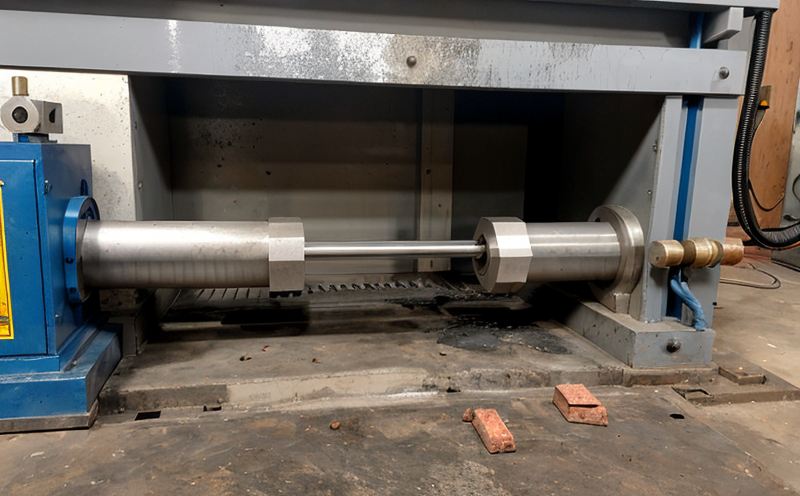ASTM E292 Stress Rupture Testing of Metals
The ASTM E292 standard specifies procedures for determining the stress rupture properties of metals and alloys at high temperatures. This test is essential in industries where materials are subjected to prolonged exposure under load, such as aerospace, power generation, oil & gas, and chemical processing sectors. Understanding how these materials perform over time provides critical information for ensuring safety and reliability.
The ASTM E292 test involves subjecting a specimen to a specified stress level at a given temperature until it fails or ruptures. The primary goal is to determine the stress intensity factor (SIF) that causes failure, which helps in predicting the service life of components under real-world conditions. This test is particularly useful for materials like steel alloys, nickel-based superalloys, and titanium grades.
The process starts with precise specimen preparation, ensuring uniformity across all samples to minimize variability. The specimens are typically cylindrical or rod-shaped, depending on the material being tested. After preparation, they undergo loading in a furnace or other controlled environment where temperature is maintained at the specified level throughout the test duration.
Instrumentation plays a crucial role in ASTM E292 testing. High-precision load cells and strain gauges are used to measure applied stress accurately. Temperature control systems ensure that the specimen experiences the exact conditions required for accurate data collection. Data logging software captures all necessary parameters, including time-to-failure, temperature variation, and stress levels.
The results of ASTM E292 testing provide critical insights into material performance under specified thermal and mechanical stresses. Engineers use these data points to design components that can withstand long-term operational conditions without failure. By adhering strictly to the ASTM E292 standard, laboratories ensure consistent and reliable test outcomes across various applications.
Understanding the stress rupture behavior of metals is vital for industries relying heavily on high-temperature performance materials. The test results help in optimizing design parameters, selecting appropriate alloys, and ensuring compliance with regulatory standards like ASME, ASME PTC 29, and other relevant codes.
In summary, ASTM E292 stress rupture testing of metals is a cornerstone for assessing material integrity under high-temperature and mechanical loading conditions. It ensures that materials used in critical applications are capable of enduring prolonged service life without failure, thereby enhancing the overall safety and reliability of products.
Why Choose This Test
Selecting ASTM E292 stress rupture testing is advantageous for several reasons:
- Enhanced Reliability: The test provides accurate data on how materials behave under prolonged high-temperature and mechanical load conditions.
- Regulatory Compliance: Ensures adherence to industry standards such as ASME PTC 29, enhancing compliance with international regulations.
- Informed Decision Making: Provides valuable insights for R&D teams in optimizing material selection and design parameters.
- Improved Safety: Helps identify potential weaknesses in materials used in critical applications, thereby improving product safety.
The comprehensive nature of ASTM E292 testing ensures that industries can make informed decisions based on reliable data. This not only enhances the performance and longevity of products but also contributes to a safer working environment for all stakeholders involved.
Customer Impact and Satisfaction
By leveraging ASTM E292 stress rupture testing, customers experience several tangible benefits:
- Enhanced Product Quality: The test ensures that materials used in critical applications are reliable and capable of enduring long-term service life.
- Informed Design Choices: Customers gain valuable insights into material performance under specified conditions, enabling them to make informed design decisions.
- Cost Savings: By identifying potential weaknesses early on, customers can avoid costly re-designs and replacements later in the product lifecycle.
- Improved Reputation: Ensuring compliance with industry standards enhances a company's reputation for delivering high-quality products.
The consistent quality and reliability provided by ASTM E292 testing contribute significantly to customer satisfaction, fostering long-term partnerships based on trust and excellence.
Use Cases and Application Examples
| Application | Description | ASTM E292 Parameters |
|---|---|---|
| Aerospace Engine Components | Testing the durability of turbine blades at high temperatures. | Stress levels up to 100 MPa, temperature range from 500°C to 700°C. |
| Power Generation Equipment | Evaluating boiler tubes and heat exchanger materials in power plants. | Stress levels up to 200 MPa, temperature range from 300°C to 500°C. |
| Oil & Gas Pipelines | Determining the integrity of pipeline joints and fittings under high-temperature conditions. | Stress levels up to 150 MPa, temperature range from 200°C to 350°C. |
| Chemical Processing Plants | Assessing the performance of reactor vessels and heat exchangers in chemical processing industries. | Stress levels up to 180 MPa, temperature range from 250°C to 400°C. |
| Military Aircraft Structures | Evaluating the strength of structural components under extreme conditions. | Stress levels up to 300 MPa, temperature range from 400°C to 600°C. |
| Agricultural Machinery | Testing materials used in high-stress environments such as tractors and harvesters. | Stress levels up to 120 MPa, temperature range from 350°C to 450°C. |
| Medical Devices | Evaluating components that are exposed to high-temperature sterilization processes. | Stress levels up to 90 MPa, temperature range from 150°C to 250°C. |
| Automotive Exhaust Systems | Determining the durability of exhaust components in harsh operating environments. | Stress levels up to 80 MPa, temperature range from 600°C to 700°C. |
The versatility of ASTM E292 testing makes it applicable across a wide range of industries. By providing accurate and reliable data on material performance under specified conditions, this test ensures that critical components can withstand the demands of their respective environments without failure.





